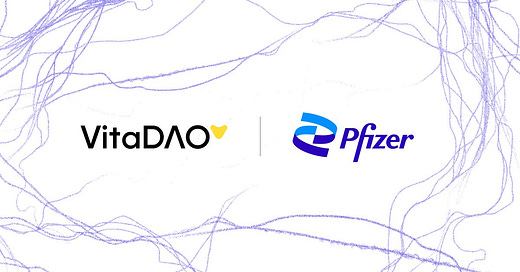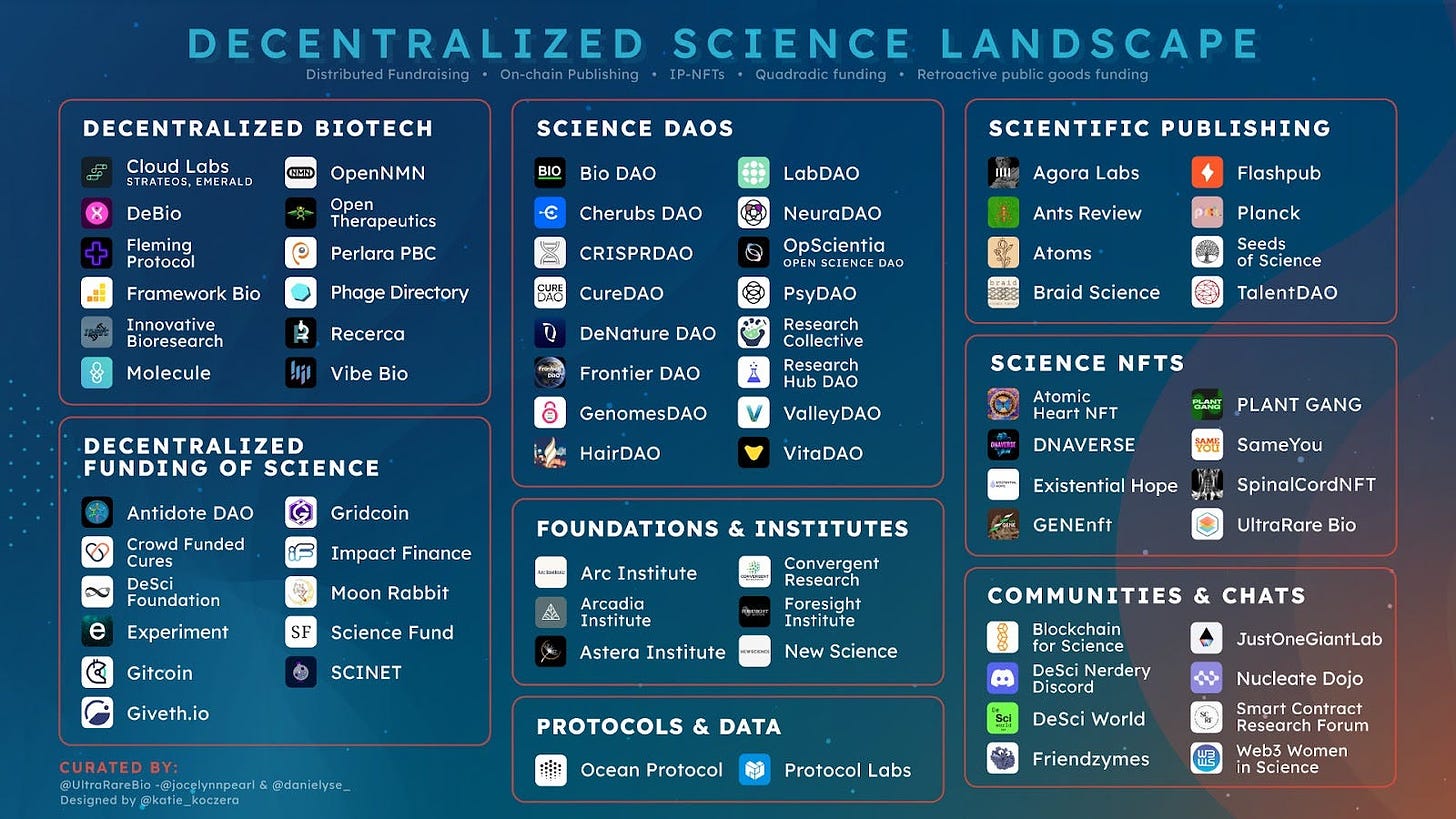VitaDAO: Pfizer-Invested Longevity Research, A New Paradigm for Decentralized Science?
Author: @0xMavWisdom
On 30 January, DeSci track longevity startup VitaDAO announced the completion of a $4.1 million funding round from Balaji Srinivasan, former CTO of Coinbase, and Pfizer Ventures, the investment arm of Pfizer, the world's largest pharmaceutical company, marking Pfizer's first investment in the Web3 space. VitaDAO will use the funding to further fund longevity research projects and biotech startups that will be spun out of DAO next year. As a result of the news, the VitaDAO governance Token VITA rose by 60% in a short period of time.
DeSci (Decentralised Science) is an initiative to create a public infrastructure for the fair and equitable funding, creation, review, crediting, storage and dissemination of scientific knowledge using Web3 tools, including NFT, smart contracts and DAO. While humanity has experienced an exponential wave of technological development in the last two centuries, there are still various financial and information access barriers in reality, and the combination of technology and Web3 may be one way to address the pain points. Vitalik Buterin, the founder of Ethereum, has also spoken about the use of quadratic funding and DAO tools such as VitaDAO to fund and organise scientific projects in a show on decentralised science. In this article, I will briefly analyse the DeSci space, using VitaDAO as an example from the biotech sector.
Funding
For a long time, many biotech organisations have only been able to raise funds through traditional channels such as equity financing, bank loans and government funding, but due to the cumbersome R&D process of most biotech startups or organisations, it takes a relatively long period of time even if the organisation eventually succeeds. In a boom scenario, financiers would have been patient enough to invest in startups with only a concept but no product, but with the Federal Reserve raising interest rates over the past year to curb monetary liquidity, hot money has flowed out of these high-risk startups. The poor performance of Cathie Wood's biotech fund ARKG in 2022 is further evidence of the limits of capital on scientific development, with many companies in the sector having to cut expenses to survive by laying off staff and reducing development costs, but at the same time slowing down the growth of the industry.
VitaDAO has funded more than 15 projects in the past year to study diseases of aging for a total of more than $3.5 million, and these attempts by biotech companies or organisations to raise funds in the Web3 space can be considered a great innovation. On the one hand, this can be seen in the change in access to funding, with startups being able to obtain funding through DAO organisations with a majority vote of Token holders. VitaDAO provides funding for startups either through traditional equity or by issuing and selling NFTs designed to represent intellectual property. In return for research funding, DAO members become co-owners of the intellectual property generated by the research. On the other hand, it will improve the research status of unpopular projects. In the past, the research direction can only be determined by the capital of institutions. It is more inclined to fund projects with short research and development cycles or large influence. The situation that some unpopular but possibly subversive research and development are blocked will be improved.
Information exchange
Much of the restricted output or access to scientific information today can be attributed to corporate and government monopolies on information and data, similar to the expensive payment thresholds that block people's access to NKI and Elsevier, and the potential for governments to interfere politically with scientific information, dampening people's enthusiasm to access or export knowledge.
The decentralised model not only lowers the barriers to entry for organisations, but also reduces the difficulty for individuals to export or access professional information, helping to eliminate information silos. Firstly, the emergence of DeSci can help to make knowledge dissemination more inclusive by removing the middleman between scientific researchers and reviewers. When information no longer has a monopoly, not only professionals in the relevant field benefit, but even amateurs who have not studied the relevant field can also access information, further contributing to the equalisation of knowledge.
Secondly, community incentives will also fuel the active export of information. VitaDAO will not only give certain VITA Token incentives to researchers and working groups who contribute data or expertise, but will also provide additional governance privileges. In addition, the blockchain's censorship-resistant nature, decentralised storage technology, is used so that scientists or specific communities can truly own scientific data.
In the past, we only saw DeSci more in academic research and publishing, VitaDAO widened DeSci by conducting clinical trials with Mantis Photonics and obtaining new data from Morten Scheibon-Knudsen's laboratory at the University of Copenhagen and Victor Korolchuk's laboratory at Newcastle University The application scenario of DeSci, so that the development of the next stage. As DeSci organisations such as VitaDAO, Antidote DAO and Dynamiculture grow in size, we will not only see further extension of the scene in the future, but also the opportunity to see collaborative projects that cross borders and academic boundaries. Projects such as the Covid-19 vaccine, which could benefit the world, but which cannot be shared due to various factors, may break through in the future.
Problem
To be clear, DeSci is still in its infancy, and the field still has questions about "whose interests will DeSci ultimately serve? ""Does DeSci lack a clear set of shared values? "and other general problems. The most important of these questions to consider is what people are building DeSci for in the end. As cognitive neuroscientist Sarah Hamburg says, DeSci is simply a tool for science, allowing scientists to integrate seamlessly into their daily work. DeSci should focus on empowering scientists to do good scientific research and get back to science, rather than focusing too much on these new tools themselves and allowing them to be reduced to financial products that are exploited for hype.
Reference:
1. Sarah Hamburg "A Guide to DeSci, the Latest Web3 Movement"
https://future.com/what-is-decentralized-science-aka-desci/
2. Chenglin Pua "The Rise of "Decentralized Science (DeSci)"
https://mp.weixin.qq.com/s/JCciOY5yc8V2ivBqGIxAeQ
Follow us
Twitter: https://twitter.com/WuBlockchain
Telegram: https://t.me/wublockchainenglish





